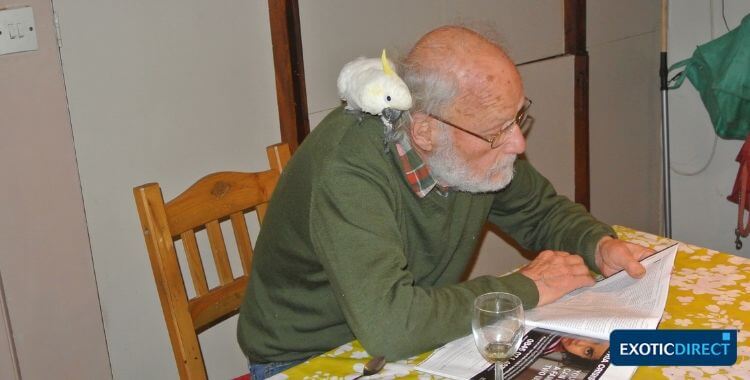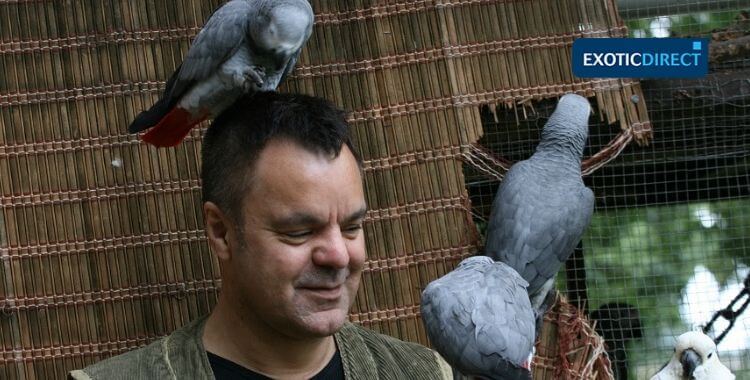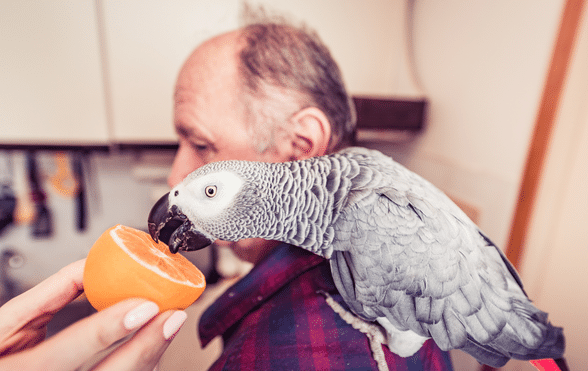To bond with your parrot you’ll need to earn her trust by playing with her, preening, training and feeding her.
Insure your parrot £5,000 or £2,500 of vet fees, death and theft | We paid 94% of pet insurance claims in 2019 | We’ve been insuring exotic pets since 1996.
A conscientious breeder will give you the bird’s current diet and routine which you gradually adapt to your own.
A bird that has been parent reared will be harder to tame than a bird that has already been socialised by the hand feeder. However parent reared birds know they are birds, so are less likely to develop over bonding behaviours.
If you can find a bird has been parent reared for some weeks and then weaned by a handler, you will get the best of both worlds.
Good husbandry and good training will help the parrot bond to you. There are no hard and fast rules. To keep a parrot successfully is as much an art as a science. The ease and speed of the bonding process depends on your attitude and knowledge and the individual bird’s age and experiences before she came to live with you.
Jump to: What is a bonded bird? | Preening as a bonding process | Playing as a bonding process | Trust | Training as an aid to bonding | Overbonding | Other family members
 Trust can help your parrot to bond with other family members
Trust can help your parrot to bond with other family members
What is a bonded bird?
Your bird will have a bright demeanor and display an obvious desire to interact with her human caregivers. She will step out of her cage willingly on her handler’s arm.
If she has been socialised to other household members, she will step up for them, too. Such a bird is the result of sensitive handling.
She will become part of the family. If harness trained, she will accompany her flock on outings.
Insure your parrot for £5,000 or £2,500 of vet fees, death and theft | We paid 94% of pet insurance claims in 2019 | We’ve been insuring exotic pets since 1996.
 Socialised parrots won’t mind being handled and will love to play
Socialised parrots won’t mind being handled and will love to play
Feeding as a bonding process
You are the food provider for your parrot and because of this, she learns to accept and bond with you.
And food is also used in training for the reward thus increasing the bond.
Having your bird out on the kitchen counter while you prepare her meals is also a great bonding experience. (Find out what you can feed her here).
Feeding as chicks will also influence the bond, but this could also lead to over bonding. There are two schools of thoughts on this.
I subscribe to the view that parent reared chicks or chicks reared for 4- 6 weeks in the nest make better pets. At this stage the parent bird feeds the chick. The responsibility then moves to the human carer.
Chicks may be hatched in incubators and fed by their owners, however because of this they may never learn how to be a proper bird or recognise themselves as such. This can cause issues with human over bonding and socialisation with other birds.
Preening as a bonding process
This is a natural behaviour for all birds, wild or in captivity. They preen one another. Partly it is to remove the keratin sheath around new feathers partly, I suspect because they enjoy the sensation.
Single birds will enjoy their favourite human gently rubbing off the keratin sheaths from their pin feathers around the head. Some carers will stroke and caress the whole body, however this isn’t recommended as it can lead to over bonding.
Others, like myself, restrict preening and general caresses to the head. An affectionate parrot will lay her head on your chest and under your chin. A delightful situation.
A bonded pair of parrots preen one another often. It is also a courtship ritual.
Playing as a bonding process
Some breeds are more playful than others – Caiques for example or Sun conures. Macaws like to play a lot. Greys can seem standoffish in comparison.
If you start off with a younger parrot, she will probably play games if she learns trust. Peekaboo, chase the ball, fly and find me, Games work best if they evolve naturally from your interactions together.
Trust between you and your parrot
The well socialised parrot and carer have developed trust between themselves. You cannot quantify trust because levels will vary.
A trusting parrot allows herself to be handled, wear a harness, be taken new places in a crate and meet strangers without alarm.
A carer who trusts her bird expects simple requests to be complied with. And doesn’t expect biting, screaming or nervous phobic behaviour.
Training as an aid to bonding
Training is the surest was of developing a trustful relationship between you and your parrot. It provides the best method of bonding with your bird without her becoming over dependent on you. (And as an extra bonus – it is fun for everyone.)
Without training any bird is hard to handle. Many birds are left to languish in a cage 24/7 because they cannot be trusted to step up, not bite or not ruin anything within reach of that curiosity which is an intrinsic part of their nature.
It is now generally accepted that positive reinforcement training using the minimum negative or punishment achieves the best and longest lasting results.
Learn how to teach your parrot to step up here.
Patricia Anderson, an American academic writes: The most effective and humane, and least intrusive, way to interact with your bird is through operant conditioning and positive reinforcement, because it empowers your parrot, gives them choice or control, and helps establish and maintain a positive, trusting relationship.”
Over bonding in parrots
This behaviour occurs when the parrot chooses a human and considers them her chosen mate. This is a sad situation when it occurs because the bird may attack anyone who comes close to her perceived mate in an attempt to warn them off.
With Amazon parrots, as well as other species, this behaviour increases during their breeding season and lessens afterwards.
It is worse with members of the cockatoo family. Many male cockatoos end up in rescues because they can only live safely with one family member.
Wild cockatoos’ bond for life and are physically affectionate with one another.
In captivity a hand raised cockatoo starts off as a cuddly winged teddy bear then when sexual maturity arrives, aggressive behaviour may follow.
The signs of an over bonded hen cockatoo are the wing shivering, the whole-body quivering. Both my greys will quiver their wings on occasion but have never developed aggressive behaviour.
How to avoid over bonding in parrots
- Good practice starts from day one
- Don’t let just one person feed and handle the bird
- Don’t overstimulate her with petting. Whole body stroking should be avoided
- Cuddling a baby cockatoo seems innocuous but when that bird matures and will bite anyone else it is no longer harmless
- Ensure the bird has enough rest time
Help the parrot hates me!
This horrid situation occurs when a parrot bonds with one member of a household and perceives the other as a threat. It can escalate into actual attacks. Can you change her mind? My answer is a qualified yes.
Here are some tips:
-
- Don’t approach the parrot when she is with her chosen person
-
- Don’t attempt to touch her if she is showing negative signs like tail flaring, eyes pinning, moving along a perch or simply flying off
-
- Don’t approach too close. Parrots keep their distance. Only bonded pairs touch one another
-
- Do try to interact when the chosen person is absent
-
- Do drop a special treat in the cage bowl and walk away
-
- Do speak nicely to her
- Do be patient
My parrot hates my family
If the parrot has bonded with only one member of a household, you can gradually accustom her to someone else by that person dropping a special treat into the bowl each time they pass and by following the guidance mentioned above.
Be aware of body language. When the Amazon flares her tail and pins her eyes, don’t try and pick her up. This applies to other species as well.
How to socialise your parrot with children
The dos and don’ts are not hard to teach a child
-
- Do approach quietly
-
- Do speak in a soft voice
-
- Don’t rush about
-
- Don’t scream
-
- Don’t poke a finger into the cage
- Don’t crowd the bird. Give her enough space
This guidance applies to everyone else too. A poked-out finger can seem like an aggressive beak to a parrot. Always use your hand held either horizontal or vertical position without fingers sticking up.
It helps to consider bonding not as a one to one privilege but more as socialising the parrot with members of your household, children, visitors and pets.
From the start in a new home, the young parrot will need to have a wide variety of experiences.
A young parrot from a good breeder will often be already socialised to accept household sounds strange people and noses.
Mixing with other pets
Should contact be allowed? This is a controversial topic. Parrots have been injured, sometimes fatally, by pet animals. Hence, the tightest caution must be complete separation.
However, many of us keep mixed species household without a problem. I do myself. If you do decide to allow it, make sure that you have judged the temperament of the animals correctly and never leave mixed species alone.
And finally
Plenty of excellent information is available free on the web, although some of this should be read with caution.
Some of the world’s finest trainers have willingly shared their insights and practice. You can find these on their websites – such as those of Barbara Heidenreich, Stephanie Edlund, Steve Martin on NEI website, Susan Friedman in Behaviour Works and Pam Clark’s blog.
Patricia Anderson writing for the IAABC Journal gives a good insight in now to trick train a parrot and thus enable it to be a good companion.
However, the best resource to help you bond with a parrot is the bird herself. Be patient, sensitive to her body language and accept that your behaviour as is incomprehensible to her (until she learns what you mean), as hers is to you.
Insure your parrot for £2,500 or £5,000 of vet fees, death and theft | We paid 94% of pet insurance claims in 2019 | We’ve been insuring exotic pets since 1996.
Dorothy Schwarz is our Guest Author. Dorothy is a parrot care expert. She has owned and written about parrots for many years, and has had her articles published worldwide.

